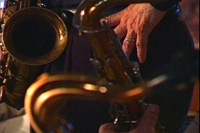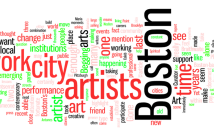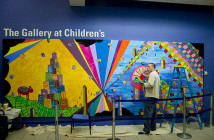The very first screening of the Fall 2004 season of Alla Kovgan and Jeff Silva's semi-weekly Balagan experimental film and video series was called "New England Beat." But a title including the phrase ‘experimental nonfiction' would have also sufficed as the show, though comprised of only New England filmmakers, was made up of mostly just that. Each work ranged from photo album-esque montages to self-consciously didactic scientific "studies." This roused several questions in the audience and myself as we were expecting a cross-section of local experimental film and video. Is that just what "avant-garde" film and video are today? Or are these types of film just popular to Boston and New England?
Or was this just a subconscious bias on the part of Kovgan and Silva?
As it turned out, it happens to be a little bit of all of them, and some of the answers are rather intuitive if you are familiar with the Boston/Cambridge/etc. film scene. Boston and Cambridge are home to many prestigious documentarians and documentary companies. Errol Morris and last year's Oscar™ winner for best doc works in Cambridge, Ross McElwee, whose film "Bright Leaves" premiered at the Cannes Film Festival's Director's Fortnight the previous year, teaches at Harvard just to name a couple. Not to mention the numerous WGBH doc ventures and their impressive repertoire of producers and directors. As Kovgan, who, like Silva, is a documentary filmmaker but also a filmmaker in residence at WGBH, pointed out there is a huge and entrenched infrastructure for documentary in the Boston area, just as there is for traditional narrative films in L.A. and New York. This is not just in the form of nationwide public television and cinema production, however; there is also several non-profit orgs supporting filmmaking and a network of screening rooms supported in large part by the areas vast number of educational institutions. These educational institutions are also responsible for turning out hundreds of young filmmakers, many of them concentrating solely on docs, every year. And as Boston is a documentary ‘Mecca,' they stick around. Some of them become professors, some work for WGBH, some get jobs at the multitude of documentary companies in and around the city.
Silva brought up two area professors, who he and Alla screened in "New England Beat," Rob Todd (Emerson) and Alfred Guzzetti (Harvard). Each filmmakers' aesthetics overlap one another from time to time and have each been classified as non-fiction filmmakers. Rob Todd has transitioned from more metaphorical and abstract films to "experimental non-fiction" over the past few years often using found footage and voice-over to retell stories in ways that evoke memory and personal experience. Alfred Guzzetti, has moved from creating traditional docs to more experimental videos which also deal with memory or the retelling of dream experiences. Though each of these filmmakers are coming from somewhat opposite spheres, the convergence of their style indicates the emergence of a new genre of avant-garde cinema.
I spoke with Saul Levine, a professor at MassArt, who was featured in the "New England Beat" program and attended the screening. He noticed the same documentary propensity in the screening as I but noted further that the work of his chosen for the show is one with much more documentary quality than his other films. This suggests a bias on the part of the curators, but it is not without rationale. Silva recognized his "own recent bias towards a more literal, less abstract cinematic experience." Silva and Kovgan both remarked that the attention to documentary or, at least, feature length journalism (sensational or not), is perhaps due to the current political climate in the US and abroad. So perhaps there is a convergence of avant-garde and documentary cinema as of late because of the political imperative of inherently activist artists. This is certainly not just in Boston, but the new glut of wide release docs are also undoubtedly not "avant-garde."
Those films are, however, influencing avant-garde cinema, in the same way contemporary mass media does with its wily devices of coercive narratives and viscerally manipulative graphics. The irony is that the methods of manipulation used by the mass media today were pioneered by the avant-garde filmmakers of the past. This was pointed out in a paper by Roger Beebe at the 2003 SCMS conference in Minneapolis, and though most of Beebe's laments, himself an experimental filmmaker, amounted to fuddy-duddish quibbles, his hypothesis that modern media could not be where it is today without the avant-garde film of the past is most doubtlessly correct. The current reverse influence, of the mass media on the avant-garde, was described by Dana Moser, another MassArt professor and multi-media artist as the "trans-subversion of the forms that have co-opted them." His own work takes advantage what Levine called the "documentary assumption:" the audience's dubious acknowledgement of what they see as ‘truth.' Journalists often take advantage of this, commonly constructing politically motivated narratives. Ann Steuernagel's "Sigh" and Nancy Andrews' "Monkeys and Lumps", also screened in "New England Beat," make use of similar artifices to Moser's (and the news media) in order to present the absurd in contexts which play with the audience's ability to tell the sensical from the non-sensical.
These films could very well be representative of the direction which the avant-garde may be going. While talking with Kovgan, she brought up the point that children do not believe anything they see on television. They have become so desensitized due to the media's manipulations, that unless they see something before their own eyes, it is perfectly unverifiable. Moser brought up the film "Natural Born Killers" and described how Oliver Stone watched months of MTV in order to find inspiration and thematic material for the film. So the film was apparently Oliver Stone's interpretation of the world represented by MTV. For youngsters, the saturation of sex, violence, and other vices popular to the MTV entertainment formula, are just part of television. For adults (somewhat paranoid ones) like Oliver Stone, it is a debaucherous saturnalia like "Natural Born Killers" was. The filmmakers who are self-consciously replicating the devices of the modern media (not so much Stone, as he was only imitating) are responding to its influence. As the media evolves and becomes more manipulative (co-opting the past avant-garde's progress in visual science and narrative), my only hope is that the new "avant-garde" continues to re-recycle and restate.
I would like to thank Alla Kovgan, Jeff Silva, Saul Levine, and Dana Moser sincerely for providing so much material to write about. I wish I could respond to all of it.
Links:
Balagan
The Coolidge Corner Theatre
All images are courtesy of the Balagan website.
Christian Holland is a founding contributor to Big, Red & Shiny.



